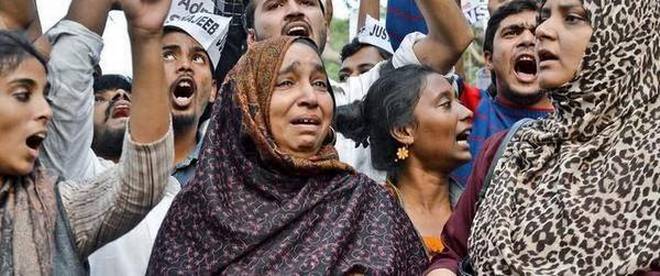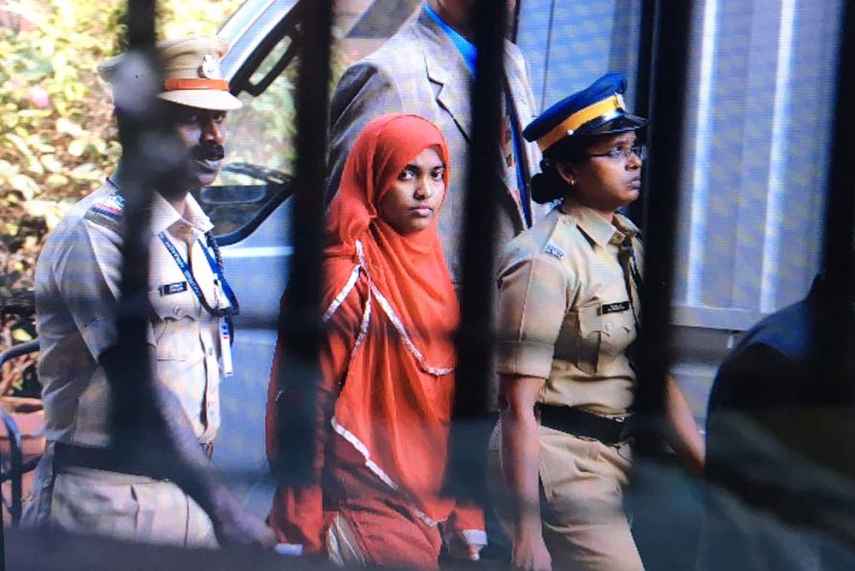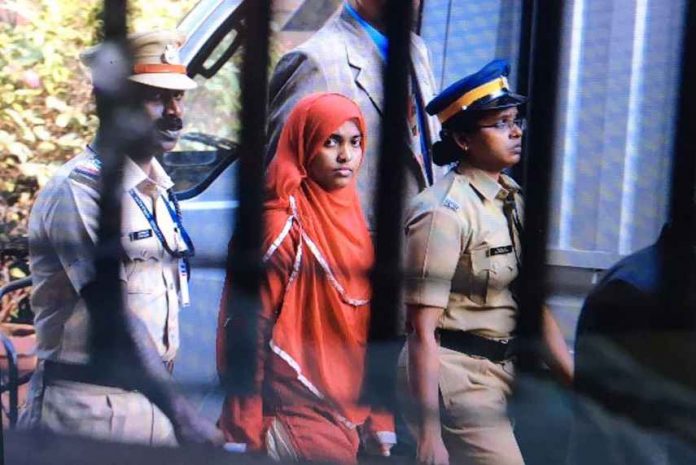
By Nazish Hussain for TwoCircles.net
What does it take to withstand the persistent atrocities and oppression by state authorities against you? The ordeal of two Muslim women in India, Fatima Nafees, mother of Najeeb and Hadiya, a recent convert to Islam serve as live examples. In contemporary India, violence against Muslims, especially hate crimes, have been on the rise. Muslims have been attacked for their mere Muslim identity. Anti-Muslim sentiments are rife and are circulated through mainstream media under the banner of “Love Jihad” “Ghar wapsi” and “ISIS sympathisers”. It has been one year now since the disappearance of Najeeb, an M Sc. Biotechnology student from JNU, who was attacked because of his Muslim identity. Fatima Nafees, the mother of Najeeb who was already suffering emotional trauma, went through a physical assault by police to fear psychosis deployed by state machinery to deter her active struggle in finding her missing son. With no positive outcome and consistent negligence from the authorities she has yet not lost hope, “Allah mujhey mere bachchey se zaroor milayega” she firmly believes.
Hadiya has been denied her fundamental human right because she chose the Muslim faith and married a Muslim man. Her choice of converting was alleged as indoctrination and a result of brainwashing. She was branded incapable of taking decisions and was put under house arrest. Her marriage to Shafin Jahan was annulled by High Court and investigated by the NIA (state institution that deals with terror cases). Despite numerous measures taken to curb her rights and deny her choice, she refuses to succumb to these tactics.Despite several rounds of counselling (by organisations to reconvert women back to Hinduism) Hadiya is sticking to her Islamic faith.
It is imperative to look here at how state and its apparatuses as the machinery of delivering justice have dealt with the cases of these two Muslim women:
Shady Investigation- After Najeeb was attacked on the night of 14 October 2016 and subsequently disappeared the next day, there has been a deliberate delay in the investigation against the accused ABVP workers who were involved in the scuffle. While it became apparent from early investigations that there is no case of forced conversion in Hadiya case, it was dragged unnecessarily and NIA was involved to investigate the marriage.
Terrorism allegations- Baseless terrorism allegations to turn the victim into a villain were deployed by media houses as a propaganda tactic to deter any public support for Najeeb cause. Media Trial of Muslims as a terrorist has been a norm with Indian media. It furthers the hate mongering against the Muslim identity. Hadiya was branded as a potential recruit to ISIS and her conversion and marriage were linked with potential influences of fundamentalism and terrorism.

Physical assault- The state authority which never dared to question the accused had mercilessly dragged the agonising mother of Najeeb on the streets. Fatima Nafees pleads in one of her interviews asking CBI to tell her about the progress in Najeeb’s case. She was aghast by the total apathy by the officials and feels compelled to hold a protest gathering near CBI Head Office as a last resort to stir some initiation by the officials. But in return, she gets mercilessly dragged by the police on the road. Hadiya pleads for her safety and alleges that she is getting physically attacked under her family custody. Familial custody was decided by the High Court after annulling her marriage to Shafin Jahan, citing her parents were not present at the time of her marriage and thus without parent’s consent the marriage of a girl is void.
Fear psychosis- State authorities who always ignored the major leads in Najeeb’s case by providing total impunity to accused had the audacity to raid the houses of Najeeb’s relatives and siege their phones. The activists who went to show solidarity with Hadiya were manhandled by the Sangh Parivar members in presence of police. The allegations of ISIS links were made against Shafin Jahan, husband of Hadiya. He was branded potential patriarch and a fundamentalist. These tactics can be seen as a measure to deter any mass support and alienate families and people concerned in these two cases.
The faith in justice has been severely damaged; the agonised mother pleads nothing but information on whereabouts of her son. Hadiya reiterates time and again that she accepted Islam as her faith on her own accord and wants to live with her husband, Shafin Jahan. The authorities have consistently failed them; the term ‘failed’ would be an understatement because the state apparatuses have deployed all sort of nefarious tactics to deter them from the due course of legal struggle in the quest for justice.
In both Najeeb and Hadiya’s issue, there has been seen a clear anti-Muslim bias by authorities who are meant to uphold the constitutional and fundamental rights of its citizens. The Muslimness of these two cases and its respective assertion in public space has been seen as problematic for a section of the liberal intelligentsia. These two cases elucidate how Muslims are treated and the perpetual Islamophobia at work that spreads across state authorities, media and also some social activist groups. The liberal intelligentsia, who problematised religion and religious pronouncements in the struggle of these women, must understand that their Islamic faith is an indispensable element in sustaining their struggle, to deny acknowledging it or problematising its assertion in public space would be a denial of the stark reality.
One must not only acknowledge it superficially but understand its explicit and implicit meaning in the daily lives of these women and impact of its repeated assertions in the context of their struggle.
The endless struggle of these two women is powered by their Islamic faith. In the face of tacit and apparent state atrocities, denial of their assertions, when a large section of society stands mute spectator or rather hold hostile opinion and suspicion perpetrated by the mainstream media, what amount of courage it takes to stand firm against continuous denial and oppression and still be hopeful of justice. Against all quashing tactics deployed against them, the steadfastness and hopefulness come from the belief that they are fighting for truth and justice. The mother of Najeeb while sharing the tale of her ordeal laments state’s apathy and indifference, she positions her faith in Allah’s justice time and again. This religious faith is what keeps her going. Hadiya’s whole fight is for the truth she found in her new religion. It is her indomitable faith in the religion and its tenets that she clings to. In her isolation and under a hostile family where she was “counselled” to give up, has clung to her faith. One of the visible manifestations is through her hijab, in all those clips and images collected from her house we see Hadiya as a visible Muslim. Even in the hostile confines of her home where she went through physical violence to leave Islam, she did not cease to be a “visible Muslim on your face”. She has held on to her faith and courageously spoken the truth at the face of the unjust state machinery. “I am Hadiya, I am a Muslim and I want to be live with my husband.” Those who deny acknowledging and dismissing their religious assertions because it doesn’t pander to their collective conscience are an accomplice in unleashing collective violence against their struggle.
The author is a Postgraduate in Mass Communication and Journalism


